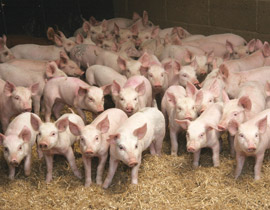Pig producers urged to secure bedding supplies

Outdoor producers have had to contend with prolonged periods of wet and arctic weather conditions since last harvest, which is having a significant effect on existing and forecast straw availability.
With 40% of the UK breeding herd kept outdoors, straw remains a vital ingredient, but reports of much lower plantings of winter cereals for harvest 2013 will mean that straw prices are likely to rise, putting further pressure on producers’ margins.
According to Farmers Weekly statistics, ex-farm buying prices for wheat straw are already quoted within the £40-£75/t range and delivery costs can add a further £20-£40/t, according to location.
This comes at a time when planning applications for straw-burning power stations have been submitted in the pig-dense regions of mid-Suffolk, Norfolk and sites at Brigg and Sleaford in Lincolnshire. The National Pig Association (NPA) is already mounting a campaign to challenge these planning applications because of the long-term effect this is likely to cause as far as straw supplies and prices are concerned.
Where possible, producers should now be looking to source straw for this harvest as well as looking for alternative bedding materials such as woodchip waste.
Where facilities exist, further savings can also be achieved by storing straw under cover because prolonged periods of wet weather can greatly reduce the amount of usable straw available, adding further to producers’ costs.
Staff training
Despite falling UK pig numbers, suitably skilled pig unit labour is also in short supply.
As a result, the NPA has been keen to encourage further staff training and have set up the pig industry professional register (PIPR), which operates under the City and Guilds umbrella and aims to recognise and reward training and development levels and to encourage progression within the industry.
This new thinking has led to the establishment of the Young NPA to help employers improve the workplace experience and to develop a reputation as an “employer of choice”. It can also build up levels of trust with employees, as well as improving training to attract more young people to join the pig supply chain as one way in which the impending skills and knowledge gap in the industry can be filled and stimulated.
